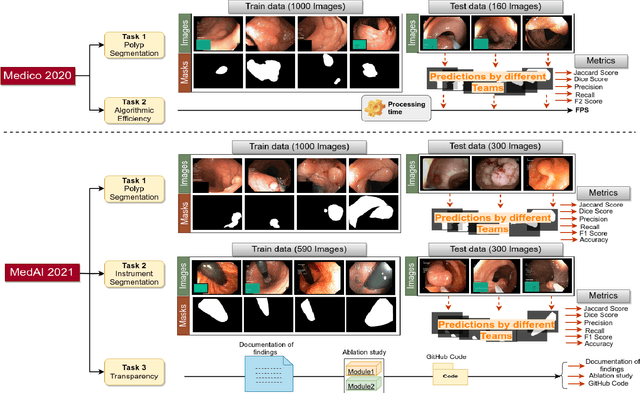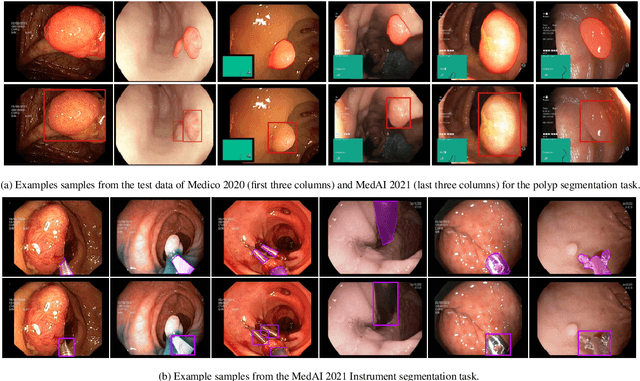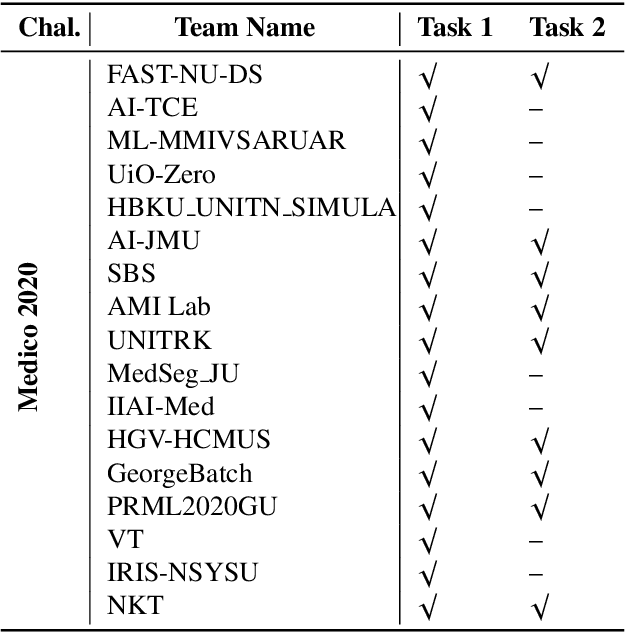Awadelrahman M. A. Ahmed
An objective validation of polyp and instrument segmentation methods in colonoscopy through Medico 2020 polyp segmentation and MedAI 2021 transparency challenges
Jul 30, 2023



Abstract:Automatic analysis of colonoscopy images has been an active field of research motivated by the importance of early detection of precancerous polyps. However, detecting polyps during the live examination can be challenging due to various factors such as variation of skills and experience among the endoscopists, lack of attentiveness, and fatigue leading to a high polyp miss-rate. Deep learning has emerged as a promising solution to this challenge as it can assist endoscopists in detecting and classifying overlooked polyps and abnormalities in real time. In addition to the algorithm's accuracy, transparency and interpretability are crucial to explaining the whys and hows of the algorithm's prediction. Further, most algorithms are developed in private data, closed source, or proprietary software, and methods lack reproducibility. Therefore, to promote the development of efficient and transparent methods, we have organized the "Medico automatic polyp segmentation (Medico 2020)" and "MedAI: Transparency in Medical Image Segmentation (MedAI 2021)" competitions. We present a comprehensive summary and analyze each contribution, highlight the strength of the best-performing methods, and discuss the possibility of clinical translations of such methods into the clinic. For the transparency task, a multi-disciplinary team, including expert gastroenterologists, accessed each submission and evaluated the team based on open-source practices, failure case analysis, ablation studies, usability and understandability of evaluations to gain a deeper understanding of the models' credibility for clinical deployment. Through the comprehensive analysis of the challenge, we not only highlight the advancements in polyp and surgical instrument segmentation but also encourage qualitative evaluation for building more transparent and understandable AI-based colonoscopy systems.
Combinatorial Auctions and Graph Neural Networks for Local Energy Flexibility Markets
Jul 25, 2023



Abstract:This paper proposes a new combinatorial auction framework for local energy flexibility markets, which addresses the issue of prosumers' inability to bundle multiple flexibility time intervals. To solve the underlying NP-complete winner determination problems, we present a simple yet powerful heterogeneous tri-partite graph representation and design graph neural network-based models. Our models achieve an average optimal value deviation of less than 5\% from an off-the-shelf optimization tool and show linear inference time complexity compared to the exponential complexity of the commercial solver. Contributions and results demonstrate the potential of using machine learning to efficiently allocate energy flexibility resources in local markets and solving optimization problems in general.
Exploring MLOps Dynamics: An Experimental Analysis in a Real-World Machine Learning Project
Jul 22, 2023



Abstract:This article presents an experiment focused on optimizing the MLOps (Machine Learning Operations) process, a crucial aspect of efficiently implementing machine learning projects. The objective is to identify patterns and insights to enhance the MLOps workflow, considering its iterative and interdependent nature in real-world model development scenarios. The experiment involves a comprehensive MLOps workflow, covering essential phases like problem definition, data acquisition, data preparation, model development, model deployment, monitoring, management, scalability, and governance and compliance. Practical tips and recommendations are derived from the results, emphasizing proactive planning and continuous improvement for the MLOps workflow. The experimental investigation was strategically integrated within a real-world ML project which followed essential phases of the MLOps process in a production environment, handling large-scale structured data. A systematic tracking approach was employed to document revisits to specific phases from a main phase under focus, capturing the reasons for such revisits. By constructing a matrix to quantify the degree of overlap between phases, the study unveils the dynamic and iterative nature of the MLOps workflow. The resulting data provides visual representations of the MLOps process's interdependencies and iterative characteristics within the experimental framework, offering valuable insights for optimizing the workflow and making informed decisions in real-world scenarios. This analysis contributes to enhancing the efficiency and effectiveness of machine learning projects through an improved MLOps process. Keywords: MLOps, Machine Learning Operations, Optimization, Experimental Analysis, Iterative Process, Pattern Identification.
Explainable Medical Image Segmentation via Generative Adversarial Networks and Layer-wise Relevance Propagation
Nov 02, 2021


Abstract:This paper contributes to automating medical image segmentation by proposing generative adversarial network-based models to segment both polyps and instruments in endoscopy images. A major contribution of this work is to provide explanations for the predictions using a layer-wise relevance propagation approach designating which input image pixels are relevant to the predictions and to what extent. On the polyp segmentation task, the models achieved 0.84 of accuracy and 0.46 on Jaccard index. On the instrument segmentation task, the models achieved 0.96 of accuracy and 0.70 on Jaccard index. The code is available at https://github.com/Awadelrahman/MedAI.
 Add to Chrome
Add to Chrome Add to Firefox
Add to Firefox Add to Edge
Add to Edge